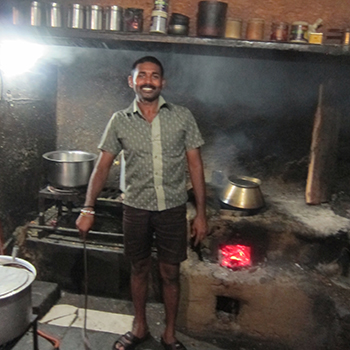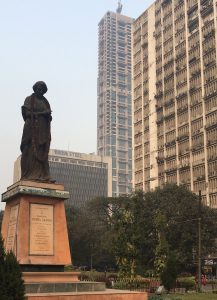
 On 23 February 2018, Karin Lundgren Kowacki at the Ergonomics and Aerosol Technology division within the Department of Design Sciences (IKDC) at Lund Institute of Technology (LTH), Lund University, defended her doctoral dissertation entitled ”The Heat is on: Evaluation of Workplace Heat Stress under a Changing Climate”. To a large part the thesis deals with workplace heat stress in India, and fieldwork has been carried out in Chennai. The faculty opponent was Dr Steve Rowlinson from the University of Hong Kong, China.
On 23 February 2018, Karin Lundgren Kowacki at the Ergonomics and Aerosol Technology division within the Department of Design Sciences (IKDC) at Lund Institute of Technology (LTH), Lund University, defended her doctoral dissertation entitled ”The Heat is on: Evaluation of Workplace Heat Stress under a Changing Climate”. To a large part the thesis deals with workplace heat stress in India, and fieldwork has been carried out in Chennai. The faculty opponent was Dr Steve Rowlinson from the University of Hong Kong, China.
One article – part of the compilation thesis – has been published in the November 2017 issue of International Journal of Biometeorology (”Climate change-induced Heat Risks for Migrant Populations working at Brick Kilns in India: a Transdisciplinary Approach), with a few co-authors including Dr. Pernille Gooch, Lund University, and Professors Vidhya Venugopal and Latha Anandh from the Department of Environmental Health Engineering, Sri Ramachandra University in Chennai. It deals with technical solutions including the use of sun-dried mud bricks and other locally “appropriate technologies” that could mitigate the worsening of climate change-induced heat. Socio-cultural solutions discussed for empowering the people who work at the brick kilns include participatory approaches such as open re-localization, and rights-based approaches including the environmental sustainability and the human rights-based approach framework.
Another article, also co-authored by Prof. Venugopal, was directly focusing on Occupational Heat Stress and Associated Productivity Loss Estimation at Workplaces in Chennai, and was published in the Global Health Action journal. its starting point was the summer of 2015, when India was hit by a scorching heat wave that melted pavements in Delhi and caused thousands of deaths, mainly among the most marginalized populations. One such group facing growing heat risks from both occupational and meteorological causes were migrant brick kiln workers. This study evaluated both current heat risks and the potential future impacts of heat caused by climate change, for the people working at brick kilns in India. A case study of heat stress faced by people working at brick kilns near Chennai where the situation is alarming since occupational heat exposure in the hot season from March to July is already at the upper limits of what humans can tolerate before risking serious impairment.
More information about Karin’s research with links to the dissertation articles.
Read an article in Swedish on the thesis in LTH-Nytt 1/2018, written by Jessica Sellergren
